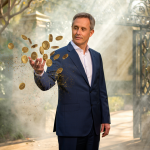Herd Mentality: Follow Blindly, Get Buried with the Rest
July 14, 2025
Herd mentality isn’t just a quirk of human behaviour—it’s the scaffolding behind everything from tulip manias to TikTok diets. It masquerades as safety in numbers, but often ends in mass delusion. This isn’t just groupthink—it’s a psychological contagion. And unless you can spot the vectors, you’re part of the petri dish.
As Elias Canetti wrote in Crowds and Power, “The crowd does not recognise danger; it does not fear it.” It moves, it swells, it consumes—and only when the music stops do its members look around and ask, “What the hell just happened?”
Markets: The Hidden Currents Beneath Booms and Busts
In markets, herd mentality doesn’t merely influence—it architects the entire damn cycle. Greed and fear often rotate in lockstep with sentiment, rather than fundamentals. People don’t buy value—they buy belief. The crowd inflates a balloon, mesmerised by the lift. Then someone whispers “pop,” and everyone runs at once.
Consider the GameStop mania of 2021. A digital flash mob armed with trading apps and dopamine surged into a forgotten stock like ants on sugar. The valuation? Irrelevant. Fundamentals? Ignored. This wasn’t an investment—it was theatre. What mattered was collective momentum. One Reddit post became gospel. Robinhood became a battlefield. And when the tide turned, many were crushed by the very force they thought empowered them.
That wasn’t new. It echoed the South Sea Bubble of 1720, when British investors threw money at a company with no real business—just hype, prestige, and a promise. Even Isaac Newton got caught in the frenzy. He famously said, “I can calculate the motion of heavenly bodies, but not the madness of people.”
Fashion: Identity by Imitation
Herd mentality doesn’t stop at portfolios—it tailors our identity. Fashion trends? They aren’t expressions of individuality; they’re group alignment rituals. The miniskirt in the 1960s wasn’t just a hemline—it was a social signal. The 2008 rise of luxury streetwear didn’t reflect aesthetics—it mirrored the migration of wealth from boardrooms to creative subcultures.
Why does this matter? Because each sartorial shift is a thermometer of the collective mood. During boom periods, fashion becomes louder, riskier, reflecting the exuberance. During busts, styles become muted and safe. The Hemline Index, once dismissed as a novelty, is a crude gauge of consumer confidence—if not mass delusion.
As Thorstein Veblen warned, consumption—clothes included—is less about utility and more about display. People wear the tribe, not the truth.
Health: Wellness by Mob Rule
Nowhere is herd behaviour more disguised as personal choice than in wellness. Every green juice, fasting protocol, or cold plunge trend that sweeps through social media isn’t science-first—it’s herd-first. The more viral it becomes, the more “true” it feels. It’s not curiosity that spreads these behaviours—it’s conformity dressed in Lycra.
The rise of intermittent fasting, bulletproof coffee, or the Liver King diet wasn’t rooted in long-term studies. It was TikTok, Instagram, YouTube—tribal signals amplified through algorithmic megaphones. And behind it all, a deep, often unconscious need: to belong, to be seen as in the know, not to be left behind.
Michel Foucault would’ve labelled this the internalised panopticon—where people self-regulate based on what they think the collective expects. Health becomes performance. Authenticity gets replaced by curated mimicry. Even your morning smoothie becomes a tribal flag.
The Pattern That Binds
Whether it’s a price chart, a pair of sneakers, or your gut microbiome, the throughline is clear: the crowd seduces. And it’s dangerous not because it’s always wrong, but because it discourages thinking. The paradox? The crowd gives us comfort by alleviating our need to make a decision.
But mastery—of markets, of identity, of health—requires brutal self-honesty. The herd won’t hand you clarity. Only the outsider mindset will. As Friedrich Nietzsche wrote, “Insanity in individuals is something rare—but in groups, parties, nations and epochs, it is the rule.”
So watch the crowd. Trade the opposite. Dress yourself. Eat what works for your biology, not your feed. Because when the herd stampedes, the cliff is never far.
The Political Stage: Power Amplified Through the Masses
Nowhere does herd mentality grow fangs more quickly than in politics. Movements swell not because everyone independently arrives at the same conclusions, but because group emotion takes over. Reason is sidelined. Signal becomes noise. Leaders stop leading—they start surfing the wave of group emotion.
Freud, in his lesser-known political writings, warned that “in the mass, the individual disappears.” He wasn’t being poetic—he was diagnosing how democracy could curdle into demagoguery.
From the French Revolution’s Reign of Terror to Trump-era populism and the Arab Spring, political mass movements follow a similar script. A collective hunger for change. A scapegoat. A moment of ignition. Then, emotional contagion takes over, amplified by traditional or social media.
That’s not politics. That’s mass psychology unchained.
Historical Thought: The Architects of Collective Behaviour
To understand today’s madness, look to the past. Gustave Le Bon, the grandfather of crowd psychology, warned that in a crowd, man becomes primitive, ruled not by logic, but by emotion, mimicry, and suggestion.
Sigmund Freud took this further. He argued that groups release the unconscious, dissolving personal accountability and rational restraint. The crowd lets the id run wild.
More recently, Sushil Bikhchandani’s theory of information cascades laid out the modern version: people follow the herd not because they’re stupid, but because they assume the crowd knows something they don’t. So they stop thinking. They copy. They conform. And eventually, the system eats itself.
That’s how viral ideas, financial panics, and cultural avalanches form, not because of a well-informed majority, but because of the illusion of safety in numbers.
The Collective Intelligence Trap: Harnessing or Getting Played?
We were promised the wisdom of the crowd. However, when emotions surge, that wisdom becomes noise. Groupthink replaces insight. Algorithmic nudges amplify herd bias. And suddenly, what felt like a smart move turns out to be a trapdoor.
Platforms like Reddit or Twitter can reveal crowd insight, but just as easily, they can ignite mass delusion. In trading, this means distinguishing between signal-driven consensus and emotion-fueled stampedes. One can guide you. The other can gut you.
George Soros built a fortune recognising reflexivity—the idea that markets don’t reflect reality, they help create it. Beliefs become self-fulfilling. That’s not just finance. That’s everything touched by mass behaviour. Belief creates movement. Movement creates belief.
Conclusion: Navigate or Be Consumed
Herd mentality isn’t just a side effect of being social—it’s a dominant force shaping your health, wealth, and power relationships. But you have a choice. You can study it, decode it, and use it—or you can drown in it.
The wise learn to recognise when the crowd is whispering truth, and when it’s screaming lies. They pause when others panic. They step back when the mob steps forward, not out of arrogance, but out of trained awareness.
This is the edge.
As Epictetus said, “You become what you give your attention to.” If you fixate on the crowd, you become a part of it. If you observe it, understand it, and occasionally walk away from it, you begin to master it.
In this arena, the herd doesn’t lead. You do.











